Will Iran’s Regime Change?
And why demonstrations don’t usually work
Last week, we covered in this premium article whether Iran’s nuclear facilities are destroyed, whether it is going to pursue a nuclear bomb, and what Israel and the US will do as a result.
This article is the last one in this series. Here are all the articles on Iran and the war against Israel:
Iran: Its geopolitics, and why it’s impossible to invade on the ground.
Why Did Israel Strike Iran Now?: Why Iran’s current government hates Israel so much, why it developed a nuclear program, and why now was a uniquely good time for Israel to attack Iran.
Where Will the Israel – Iran War Go from Here?: Israel’s goals in this war, how they’ve fared so far, and what’s left for them to do.
Will Iran Pursue the Nuclear Bomb? Yes, and how that pushes Israel to want to topple the Iranian government.
Which leads us to this:
Israel’s situation room, July 3rd 2025
PRIME MINISTER NETANYAHU: Gentlemen, we’ve lived under the yoke of Iran’s threats since the 1979 Islamist Revolution. For decades, we’ve feared their buildup of proxies around us, their ballistic missiles, and more importantly, their nuclear program.
But we saw a unique window of opportunity and we took it. Today, their proxies are neutralized, their ballistic missiles program in shambles, their nuclear program in tatters. This is a dream come true. We are safe today.
EYAL ZAMIR, CHIEF OF THE GENERAL STAFF OF THE ISRAEL DEFENSE FORCES (IDF): Today, but not tomorrow. Iranian government leaders will see their weakness and conclude that their only hope to hold onto power is a nuclear weapon.
So should we wait for them to succeed?
Should we strike again in a few years, knowing that every time they will learn more and defend themselves better?
Should we just continue assassinating their nuclear physicists and destroying their nuclear facilities?
…
Or should we take advantage of their weakness today, go straight to the root, and topple the government?
NETANYAHU: Can we even do that? We should weigh the pros and cons of trying. David?
DAVID BARNEA, DIRECTOR OF THE MOSSAD: We should break the question down into four pieces:
We can’t topple a popular government. Do Iranians want the current government to stay or leave?
Iran is a country with very strong secret services and tools to oppress its population. Can we weaken that machinery?
You can’t just hit the current government and hope somebody else will emerge to take over power. Are there alternative sources of power that can challenge the current government?
If so, how can they actually take power?
1. How Much Do Iranians Want Another Government?
Iranians have been protesting against the government ever more frequently in the last couple of decades:
I still remember the Green Movement in 2009:
As recently as May 2025, there were strikes and demonstrations from truck drivers, nurses, farmers, and retirees across dozens of cities.
During Israel’s bombing of Iran, people manifested their discontent with the regime:
But demonstrations might not be representative. What do people really think? It’s a tricky question, because who do you ask?
Iranians inside the country can’t speak freely.
Iranians abroad are self-selected to escape the regime. They will be against it by default.
That said, this is the data we have:

Here’s another survey, from Gallup:
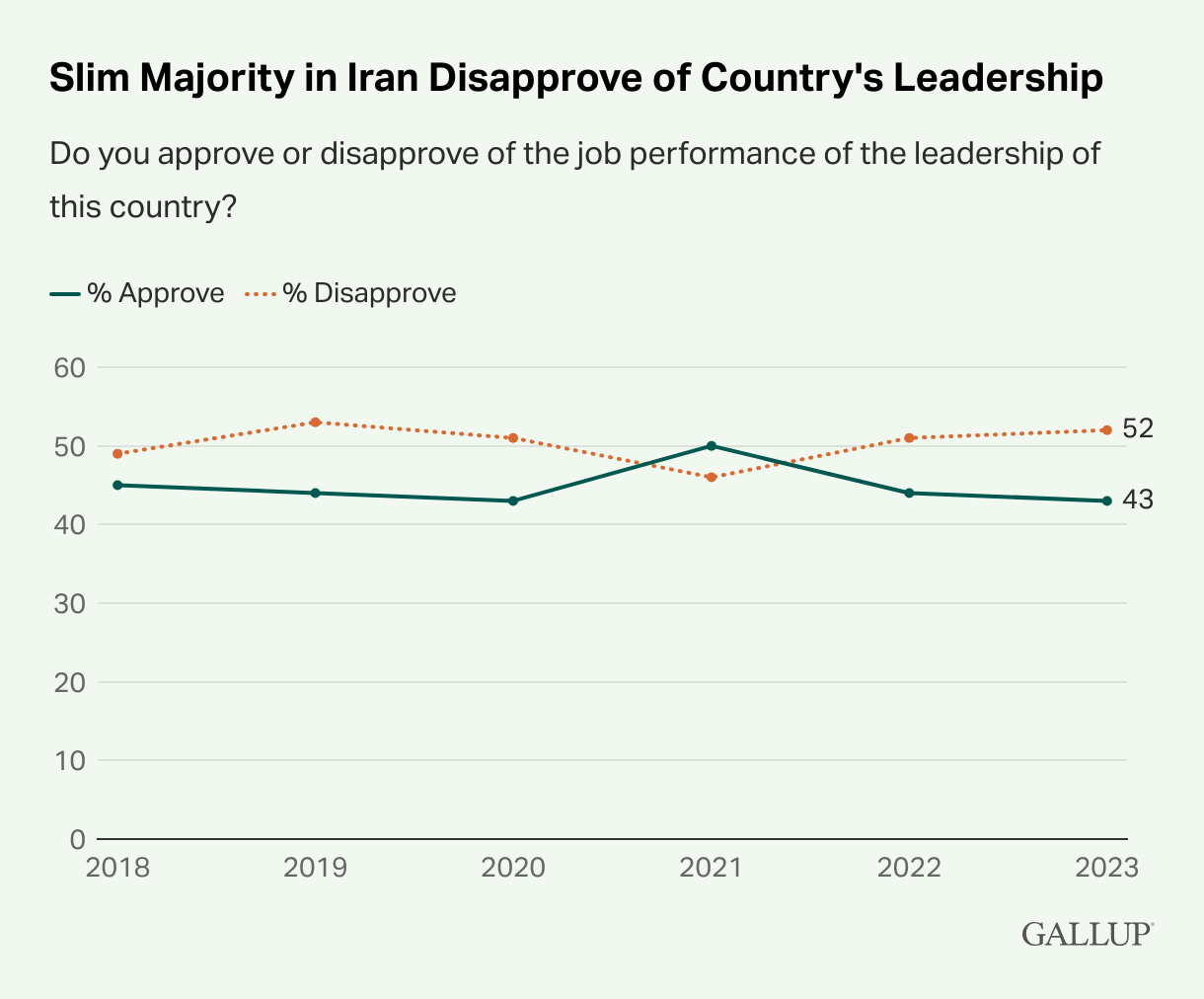
A less biased1 source suggests the number of people who would oppose the Islamic Republic in 2019 was 70%. A leaked study by the regime’s Ministry of Culture and Islamic Guidance found that 73% of Iranians wanted a separation of Church and State.
Additionally, 74% of Iranians think their economy is bad:
This is partly due to sanctions, but Iranians know it’s not only that.
I’m going to assume that 50-80% of Iranians want a regime change. But they don’t want just any regime change:2
As an Iranian, I can tell you the situation is no longer just political—it's existential. We are trapped between two collapsing structures: one internal, one external. On one hand, we face a deeply dysfunctional government, led by the Supreme Leader and the Islamic Republic’s unelected institutions.
Decades of economic mismanagement, suppression of dissent, and brutal ideological control have alienated multiple generations. No one believes in reform anymore—because every attempt has either been co-opted or crushed.
But here's the paradox: We are also terrified of regime collapse—because we've watched the aftermath of Western intervention in countries like Iraq, Libya, Syria, and Afghanistan.
Each was promised freedom; each descended into chaos, civil war, or foreign occupation. So no, we don't trust the U.S. or Israel. Not because we support our regime—but because we know how imperial powers treat ‘liberated’ nations in the Middle East.
Freedom, in their language, often means vacuum, fire, and permanent instability. Right now, many Iranians live with three truths at once: The Islamic Republic is morally and politically bankrupt. The alternatives offered by foreign actors are not liberation—they’re collapse. A bad government is survivable. No government is not.
We are not silent because we agree. We are cautious because we’ve learned—too well—what happens when superpowers decide to "help." In a sentence: Iran is a nation held hostage by its own regime, but haunted by the fate of its neighbors. We are stuck in a house we hate, surrounded by fires we fear more.
And if 50-80% of Iranians want the regime to change, it means 20-50% don’t. Who are these people?
Iran ranks 151 out of 180 in corruption:
But wait, if there’s corruption, it means somebody benefits from it, right? In Iran, if you are upper class or upper-middle class, you are part of the government, whether directly or indirectly. The military, public jobs, businesses with government contacts… All are supported by the government, This means there are tens of millions of people with a vested interest in the regime staying in power.
So:
A powerful minority of Iranians want the current regime to stay, because they benefit from it.
While the vast majority wants the regime to be toppled.
However, they’re scared of what would happen if the current regime falls.
More importantly, they fear the regime’s oppression:
2. Iran’s Oppressive Machinery
It’s hard to coordinate an uprising when an oppressive machinery is liable to kill you every time you step outside.
Iran is rated 160th out of 165 countries in freedom. Since 2022, more than 4,000 street protests have taken place across every province in Iran, more than 21,000 protestors have been arrested, and more than 550 people killed.
People feared this would become ten times worse after Israel’s bombings.
They were right.
"All of Tehran has turned into a military barracks. Suppressive forces [Basijis] are patrolling through the streets, harassing everyone just like in previous uprisings and massacres [2022, 2019]. You can’t walk through streets without facing trouble. If even one of Khamenei's dogs suspects you and checks your phone, they’ll handcuff you on the spot and take you away. They accuse you of collaborating with Israel. Why? Because you're happy that the murderers of Mahsa, Nika and Hamidreza [well known victims of the IR] are finally dead. I spit on the grave of all the so-called 'fellow Iranians' abroad who are trying to keep these bastards in power.
Right now in Iran, there is a full-scale security crackdown. Armed checkpoints are everywhere. IRGC, Basij, and plainclothes forces are stopping cars, searching phones, and intimidating people.
On top of that, the regime is taking families of Iranian journalists and activists abroad hostage, threatening them to silence opposition voices.
Dozens were arrested today. Several were executed this week under false charges of "spying for Israel", the regime uses fear and lies to justify killings.—Source
Five million fleeing Tehran, IRGC patrols executing anyone they accuse of being Mossad without trial, internet blackouts choking 97 percent of the country, bombs falling, thousands of activists dragged into cells, no coordination, no signal, no air to breathe.
Organizing in that dark isn’t courage, it’s suicide.—Source
Israel’s Attacks on Iran’s Repression Machinery
This is how we should interpret Israel’s intense bombing of Iranian defense forces, focused on the Islamic Revolutionary Guard Corps and the Basij militia:
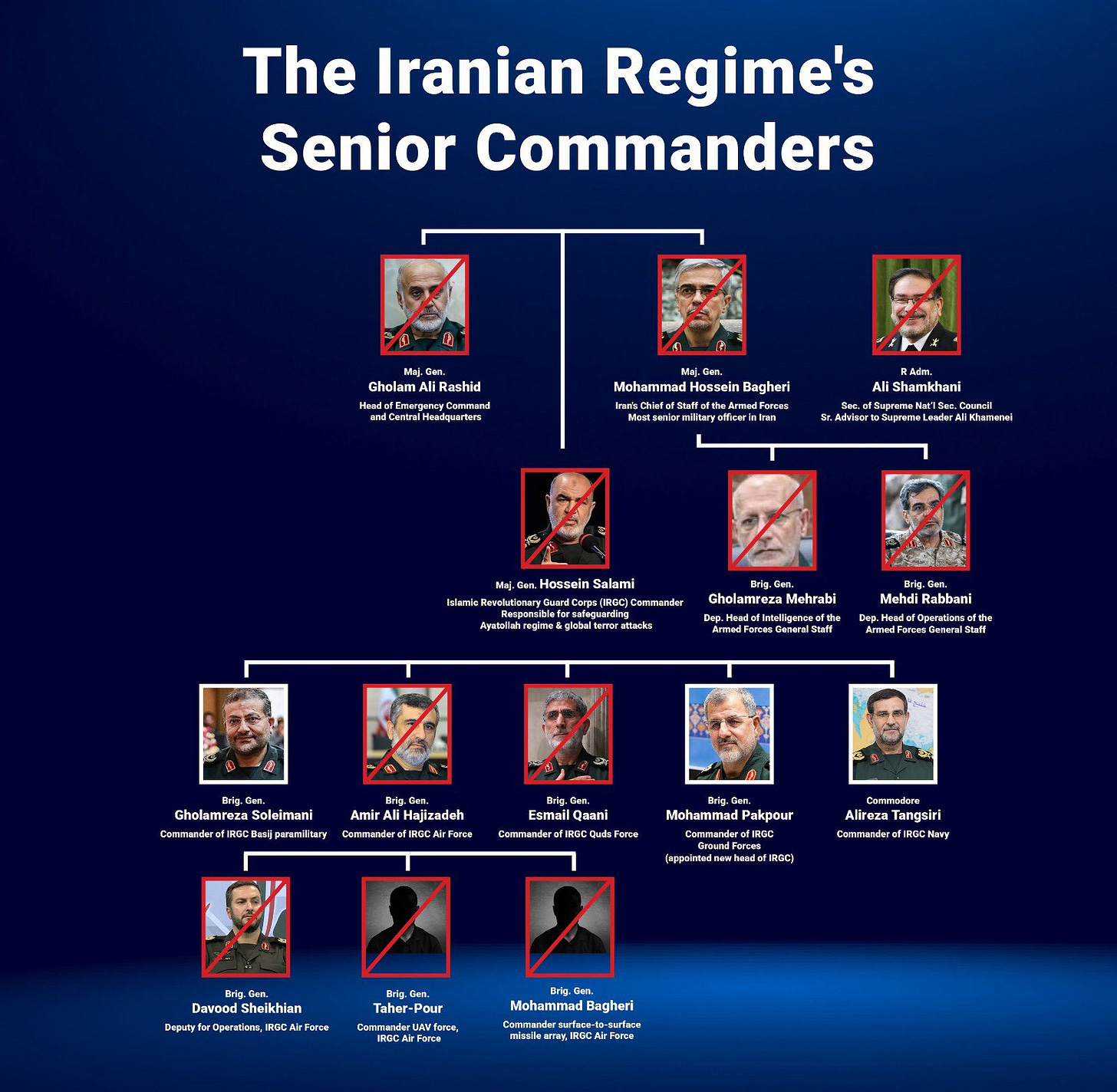
You can witness the specific targeting of IRGC here:

Israel has also bombed many Basij and IRGC facilities:3
The Basij headquarters in Tehran and Isfahan
IRGC provincial units in the Alborz Province and in Tehran
The Evin prison for political prisoners
The IRGC Amand Missile Base near Tabriz
The Imam Hossein missile base in Yazd
The Shahid Mostafa Khomeini base in Qom (which housed ballistic missiles and drones)
The IRGC’s Islamic Republic of Iran Broadcasting (IRIB)
The Ministry of Intelligence and Security (MOIS)
The Law Enforcement Command (LEC) headquarters
And many more. And Israel won’t stop here:
But this is not enough.
External Support
We saw in this article that Iran is a strong regional power, but it depends on international superpowers. For the last century, it’s been in turn dependent on the British, the US, and Russia. Since it’s so central in the world, it’s very hard for an Iranian regime to stay in power if many of its neighbors want it toppled.
Obviously, the US is not thrilled with an Iran that used to be an ally and now wants its elimination.
Iran is also against Saudi Arabia, because Saudi Arabia is:
A monarchy
Aligned with the West
Emerging as a local power that challenges Iran’s goals of regional domination
Is Sunni (as opposed to Iran, majority Shia)
It’s why Iran has supported Houthis in Yemen against the interests of Saudi Arabia, or why Iran sent drones to attack Saudi refineries in 2019. As a result, Saudi Arabia is no fan of Iran either, and would like to see it toppled.
Jordan and the UAE are other Sunni monarchies, and see themselves similarly at odds with Iran.
Egypt is a republic like Iran, but it’s a secular one. In fact, the Muslim Brotherhood is banned there—not what theocratic Iran loves. So Egypt is no fan of Iran either.
Up till now, the biggest benefactor was Russia, but Russia never wanted a competitor, only a subordinate ally, so it never aggressively pushed for Iran’s development. And now that it’s entangled in Ukraine, it can do little to support Iran.
So Iran is uniquely alone today. Its oppressive regime is being pummeled by Israel, and is not supported from outside.
But as you can imagine, you can weaken the leadership of the Basij and IRGC and starve it of support, but you can’t bomb your way to eliminating hundreds of thousands of members. You need others to be strong enough to rise and topple the regime.
3. Alternative Sources of Power
In 1979, when Shah Pahlavi escaped Iran, Khomeini was already famous as a strong voice against the pro-Western government, which made him a logical successor to power. But the current government is much more careful about allowing alternative sources of power. Who, then, could emerge to successfully fight and replace the Ayatollah, the IRGC, and the Basij?
An obvious candidate is Reza, the son of the previous Shah Pahlavi:
He was active on social media to push for an uprising, and he was hoping to help transition from the current regime.4
At some point he had some support:
Even from the military:
But of course, not everybody wants a monarchy, especially led by someone who spent his life in the US. It’s unlikely he will take power in the coming weeks.
There’s also the People’s Mojahedin Organization, but they’re Islamist Communists, so that’s that.
Another alternative could be Mir Hossein Mousavi, who likely won the popular vote against Ahmadinejad in 2009, but the government rigged the election. He’s been under house arrest ever since.
There are also some activist groups—especially students, the same that brought Khomeini to power—but these don’t seem to be nationally present or strong.
Then there’s this:
Syria fell into a civil war through ethnic conflict.
Lebanon fell into a civil war through ethnic conflict.
Iraq has suffered from ethnic strife since the 2003 invasion by the US.
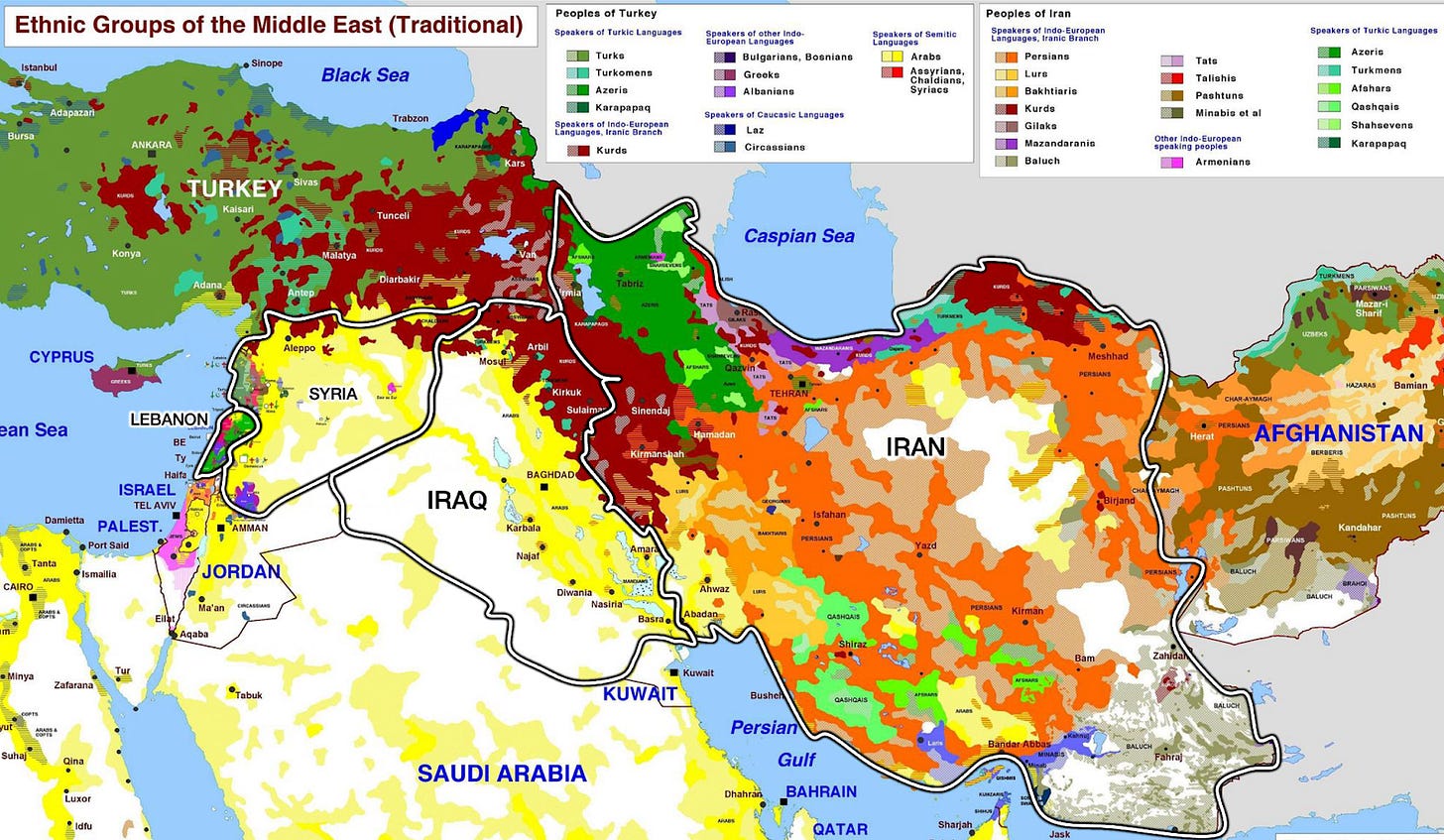
One of the keys to these uprisings is that ethnicities span across borders, and this is true in Iran, too.
The Kurds have already found some autonomy via military force in Syria and Iraq. It would not be a stretch to expand it in Iran.
Azeris also have their share of military experience. Azerbaijan recently won against Armenia in its conflict over Nagorno-Karabakh. Notably, Azeris were supported by Turkey—a local power that vies for regional supremacy against Iran—while Iran supported the losing Armenia.
The Baloch are in a remote, desertic, mountainous area that straddles Afghanistan and Pakistan, although they’re not politically organized as strongly as the other groups.
If we look at what happened in other countries in the region, when ethnic conflict challenges the central power, there’s civil war.
Iran knows this and suppresses these regions more violently than the Persian heartland.
And here we face a coordination issue. Kurds, Arabs, Baloch… all are small minorities that can’t challenge the Persian heartland. Only the Azeris are big enough to do it, and they could be supported by Azerbaijan, but there are only 10 million Azeris in Azerbaijan, so their support from outside could not single-handedly topple the Iranian government, or even allow Azeris to proclaim independence. If all minorities rise in arms at the same time, they could split the focus of the military and have a chance at remaining independent after a civil war, but how could they coordinate? Very hard with an Iranian regime so aggressively present in the regions.
4. How Can Alternative Sources of Power Win in Iran?
Iranians demonstrated in 1979 and toppled the government.
But they’ve been demonstrating for decades since then, with no success. Why?
This leads us to a core misconception in politics today: Demonstrations don’t usually work.
People take to the streets, make noise, nothing happens, and then they go home. Some examples outside of Iran are the Occupy Wall Street or the Women’s Protests against Trump in 2016.
Why? Because people in power don’t want to lose it. They won’t simply vacate it when there’s opposition. The only way they will change is if their power is threatened.
In democracies, power can be threatened if the demonstrations are huge and if they raise awareness on a previously unknown injustice. This can swing people’s vote, and throw the current parties out of power. But if the protest does not reveal new information, everybody already knows about a problem and protesting against it won’t change opinions much, so it won’t change who’s in power.
And this is in democracies! In autocracies like in Iran, the government doesn’t care about people’s opinions: Their vote doesn’t count anyway! So what moves the people in power? A threat to their lives. If they think they can be killed, they will run away.
But of course, the government controls the security forces. Who owns the gun owns the power. In democracies, the military follows the constitutions of the country so they don’t influence political outcomes. In autocracies, the autocrats control the guns—and that’s especially true in Iran.5 So how can opposition win? Only if, somehow, they can get ahold of the guns.
This is how we should interpret Israel’s constant attacks on the leadership of the government, the IRGC, and the Basij militias. Note who is not present there: the leadership of the rest of the military. That’s because after 46 years of radicalization of the IRGC and Basij, it’s unlikely they will turn on the government. But the military is not as radicalized, is farther from the government, and has more to win by toppling it.
We’re now ready to understand everything Israel and Iran are going to do in the coming months.
Takeaways: The Next Few Months in Iran
Iranians want the end of the regime.
But they’re concerned about chaos and what might emerge from regime change.
The regime doesn’t want to be toppled, so it’s doubling down on its brutal suppression of dissent.
Supported by a strong and powerful minority that benefits from the regime
The oppression has prevented alternative sources of power from emerging in the past, and there are few valid ones today.
Regardless, autocracies usually only fall when they’re threatened by guns.
Ethnic minorities could access these weapons. If they revolted, they could drag Iran into a civil war. But they don’t necessarily want that unless the Persian government is weakened, and they can’t easily coordinate between themselves to rise at the same time.
The grip on power of the current government is based on the guns of the IRGC and Basij militias, who are not about to topple it as they’re the most vested in its success.
But the broader military is not as close to the government, so it might be the most interested in rising up.
And this might be especially true now that Iran has few superpowers supporting them.
All of this is why prediction markets don’t think the Iranian regime will fall in 2025:
So the government is unlikely to fall, but Israel will nevertheless try to make it happen.
MOSSAD DIRECTOR: This won’t be easy. To topple the Iranian regime, we need to decapitate the government, the IRGC, and Basij. The weaker these guns, the more likely alternatives can emerge.
Then, we need to talk with all sorts of alternative political leaders inside and outside of Iran, to see if they could form a coalition against the government.
At the same time, we need to talk with anybody who might help ethnic minorities rise: Azerbaijan and Azeri leaders in Iran; Kurdish leaders across Iran, Iraq, Syria, and Turkey; Arab leaders in Khuzestan; Baloch leaders; Turkey or Saudi Arabia if they want to support any of these ethnicities; the US if they want to help…
HEAD OF THE IDF: Not just ethnic support. We also need to make sure that no external government props up Iran. We need to break any support from Russia, and we need to definitely prevent the Chinese from jumping in.
MOSSAD DIRECTOR: Yes, that’s true. Then, with all these collaborators, we must provide them with either weapons, money, coordination, or all of the above.
Finally, we must get in touch with all the military leaders we can outside of the IRGC and the Basij, and try to give them support (money and coordination?) to rise up against the government whenever the right moment arrives.
NETANYAHU: So, destroy the current government, prop up new centers of power, push them against each other, and prevent Russia and China from intervening. That is a long shot…
This article ends the Iran series. In the premium article this week, we’re going back to the deep patterns of fashion, to understand why we dress the way we dress through examples like jeans, athleisure, suits, and saris. Subscribe to read it!
From Brookings: This remarkable hypothetical was not declared by an exiled Iranian dissident, but by the well-known Tehran political science professor, Sadegh Zibakalam, in an interview during the upheaval that took place in late 2017 and early 2018.
This is the source of the anonymous comment. I tried to find this comment on this guy’s Youtube Channel but couldn’t, so my confidence in his claim that this is an actual quote from a guy on his YouTube is low. That said, I’m not sure this is relevant because the comment makes sense by itself.
I asked this to Grok and ChatGPT, and looked at the sources. I didn’t check every one of these, so don’t take this list as final. Rather, I thought it illustrates well a fact that I haven’t seen disputed anywhere yet: That Israel is targeting with special intensity the IRGC and the Basij militias.
And maybe attain power…?
Note that when the Shah Pahlavi lost, a key element was that he lost the control of the military, because he didn’t want to let them loose on civilians.


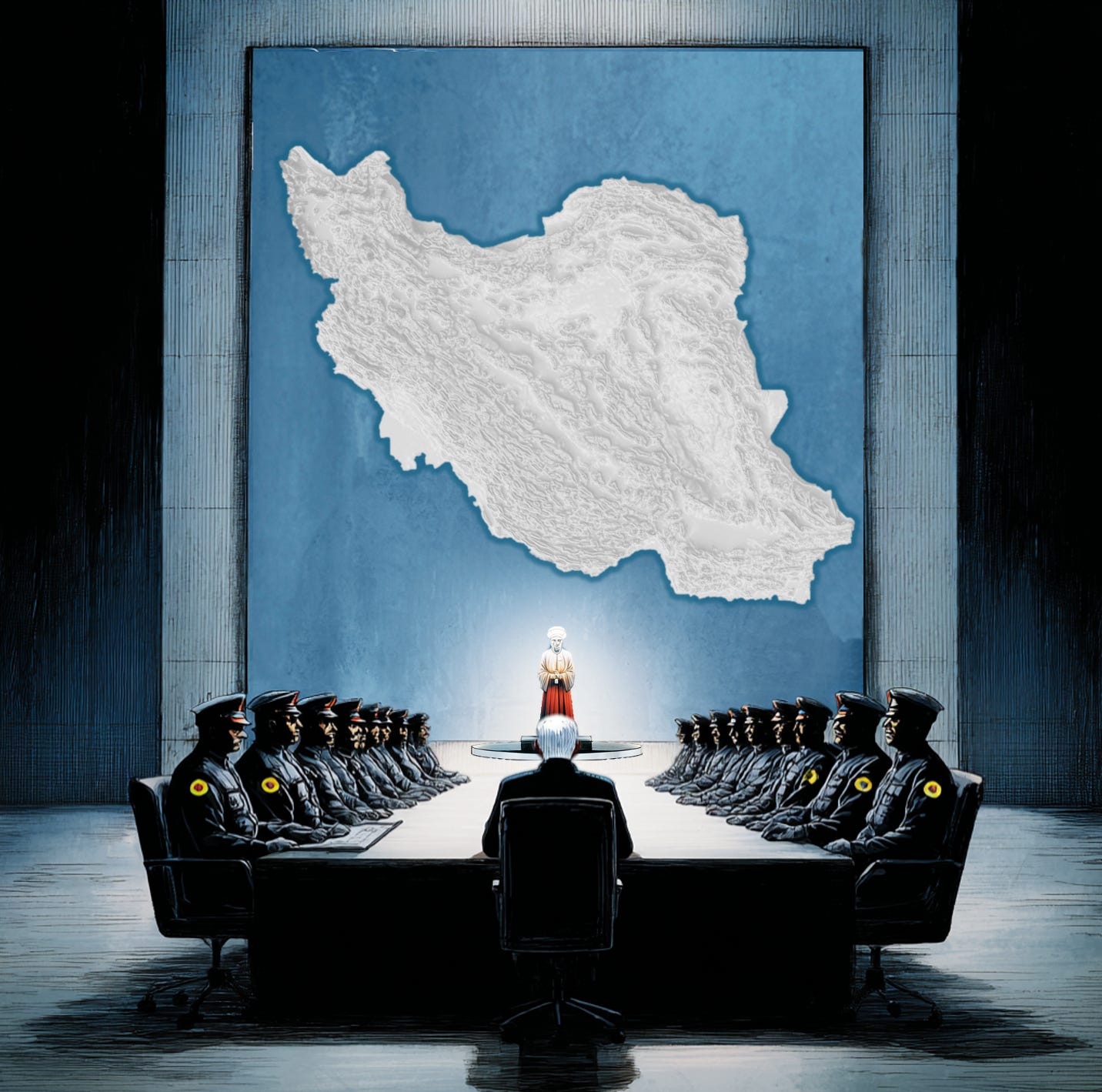


















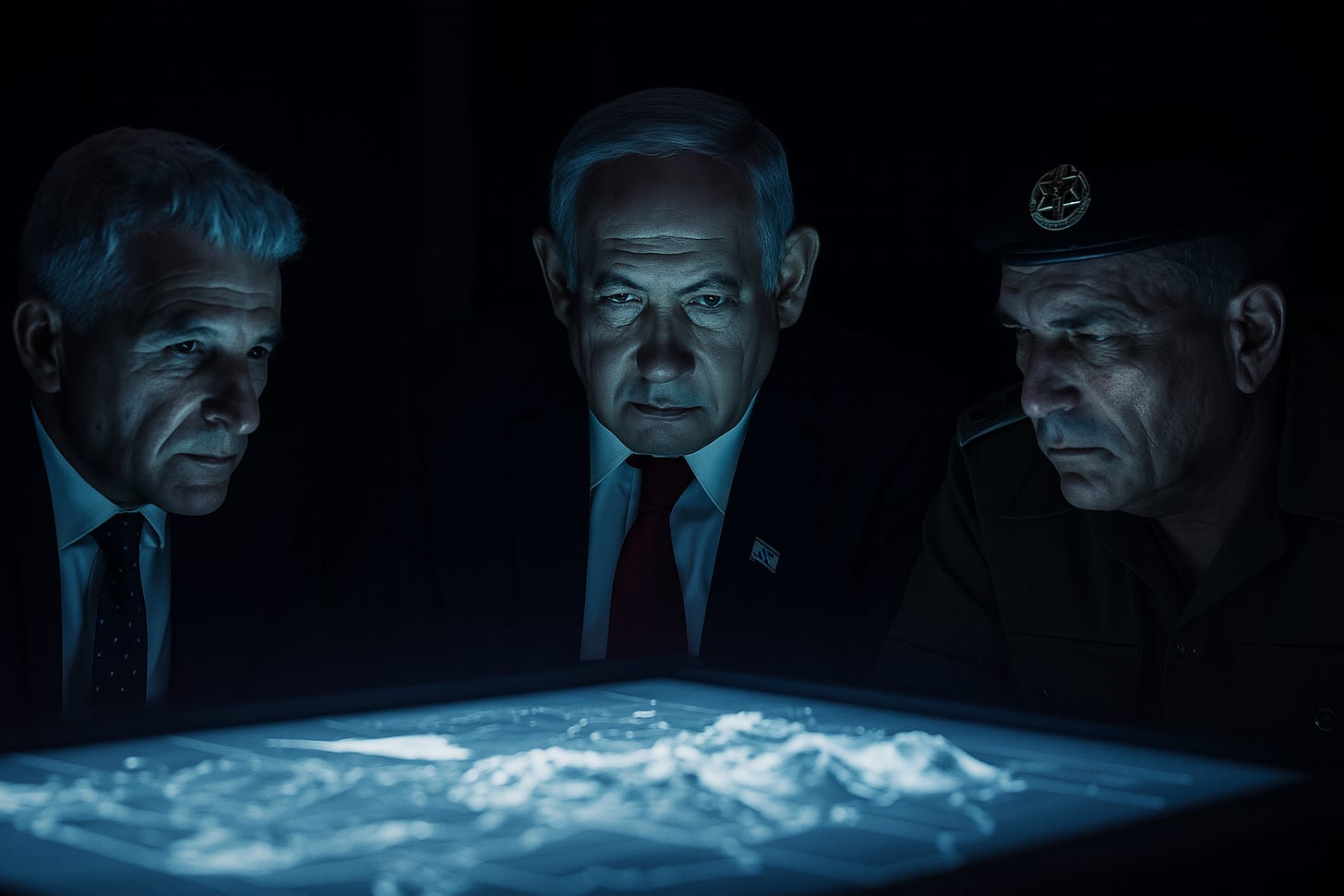
Thanks, it's pretty exhaustive about, until now, the underestimated interaction among different factors. Many other external and regional actors (from the USA to the EU) had to realize and try to pay attention and give a contribution. It's also because of the underestimation of many factors and a lack of "common understanding" that Europe supported Iran and the rising confessionalism in the Middle East area
You refer to GAMAAN data, noting its impartiality, but a fairly convincing investigation proving the opposite can be found in the very same ChatGPT link you provide
¯\_(ツ)_/¯